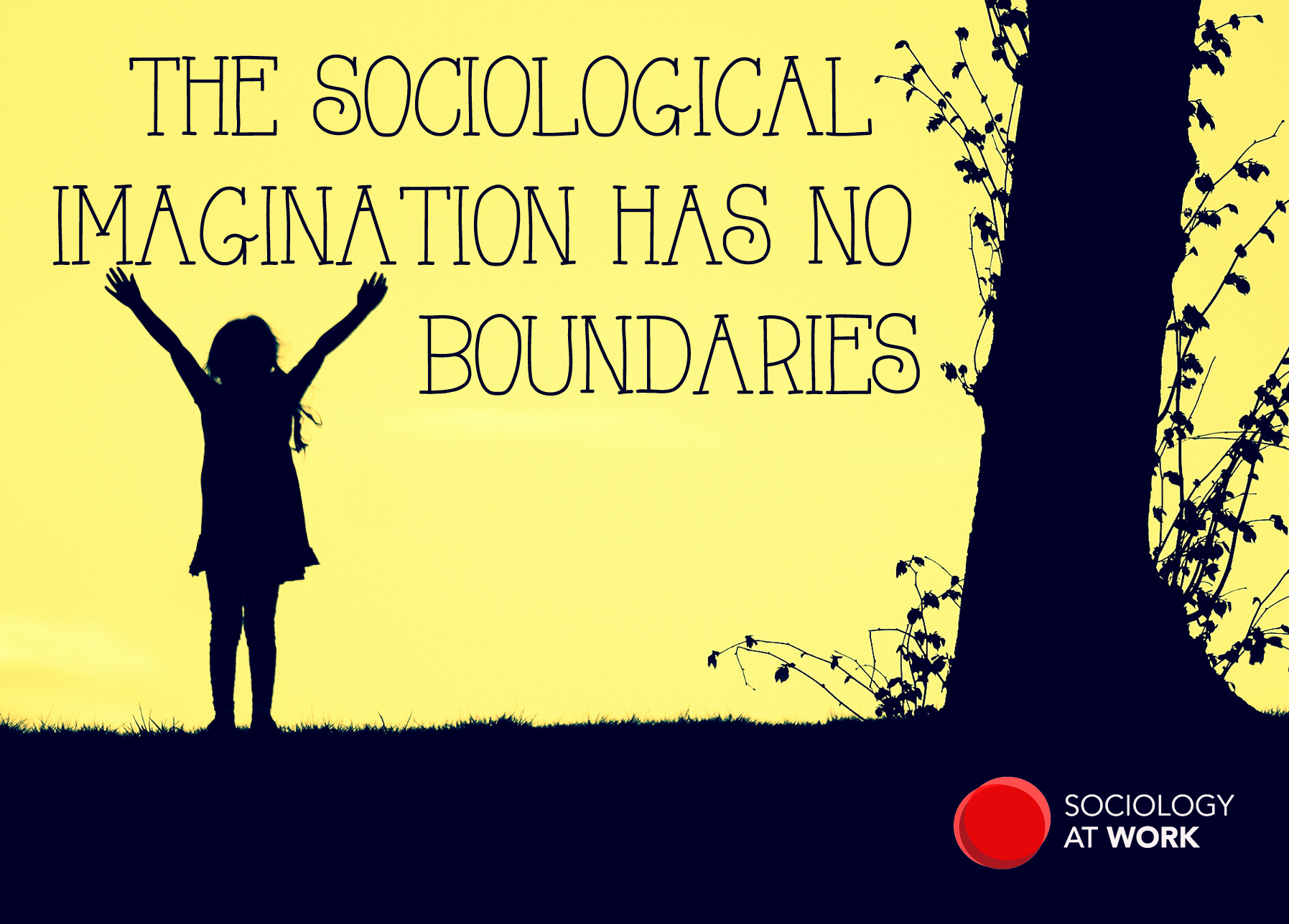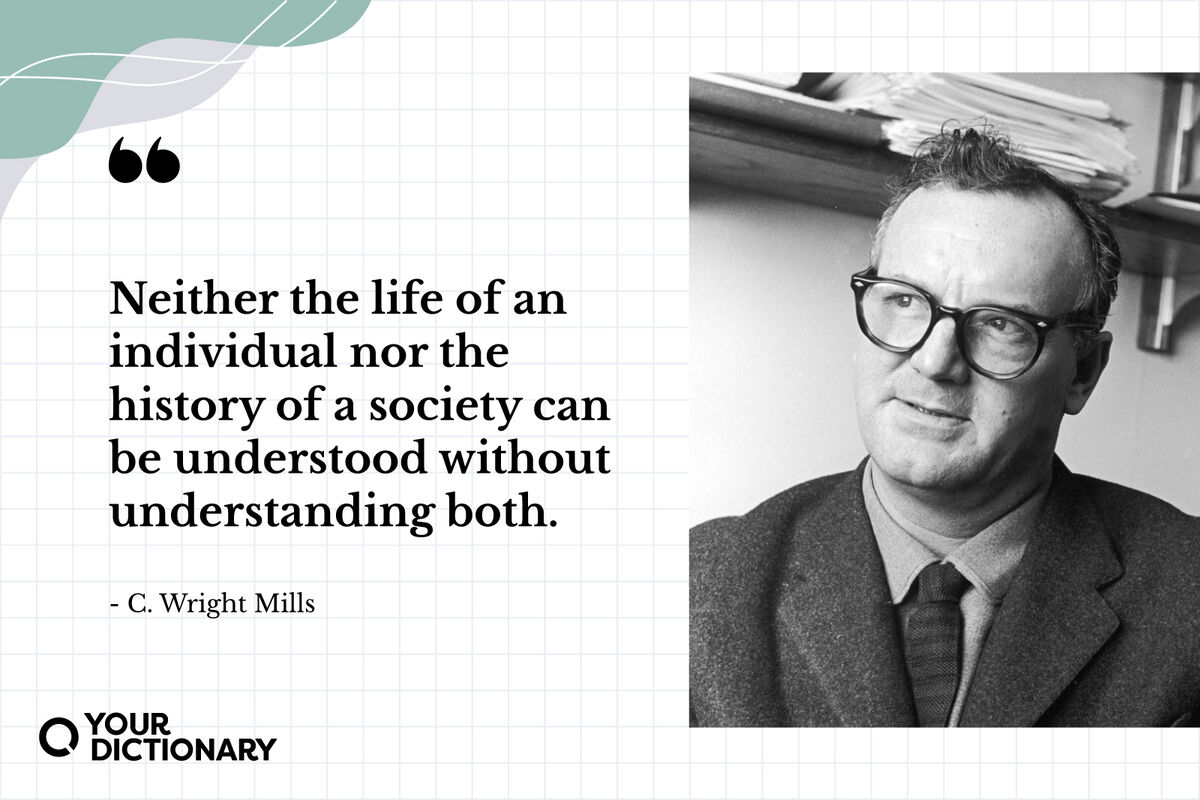Imagine this: You’re waiting in line at the grocery store, your shopping cart overflowing with the week’s essentials. You glance at the person in front of you, their cart filled with gourmet cheeses and imported wines. You might think, “Wow, they must have a lot of money.” But what if you took a step back and asked yourself, “Why do people choose to eat differently? What factors influence their food choices?” It’s this kind of questioning that forms the heart of the sociological imagination.

Image: info.umkc.edu
On the surface, the grocery store line might seem like a mundane experience. But the sociological imagination invites us to look beyond the individual and examine the broader social forces that shape our choices, behaviors, and even our identities. It’s a powerful tool for understanding ourselves and the world around us.
The Power of the Sociological Imagination: Seeing Beyond the Individual
Coined by sociologist C. Wright Mills in 1959, the sociological imagination refers to the ability to grasp the connection between personal troubles and public issues. It’s about stepping outside our own immediate experience to see how larger societal patterns and structures influence our lives.
For example, imagine a student struggling in math class. A simple, individualistic perspective might focus on their lack of aptitude or effort. But the sociological imagination encourages us to look further. What are the social factors that may be impacting this student’s success? Maybe their home environment lacks access to resources like books and computers, or maybe systemic inequalities in education disadvantage them. The sociological imagination helps us move beyond blaming the individual and see the larger forces at play.
Understanding the Importance of Social Context
The sociological imagination recognizes that our lives are shaped by the social context in which we live. This context includes factors such as:
- Social class: Our socioeconomic status influences our access to resources, opportunities, and even our worldview.
- Race and ethnicity: Systemic racism creates disadvantages for people of color, shaping their experiences and opportunities.
- Gender: Gender roles and expectations influence how we are perceived and treated, creating different opportunities and limitations.
- Culture: The values, beliefs, and norms of our culture shape our understanding of the world and our place within it.
- History: Our past experiences shape our present and influence our future.
By understanding these social forces, we can gain a deeper understanding of the challenges and opportunities we face as individuals and as a society.
Developing your Sociological Imagination
Developing your sociological imagination is an ongoing process. It requires cultivating a critical perspective and asking questions about the world around you. Here are some tips:
- Challenge assumptions: Question your own biases and perspectives. Are you making generalizations based on limited information?
- Seek out diverse viewpoints: Read books, articles, and blogs from a range of perspectives. Listen to people from diverse backgrounds.
- Look for patterns: Identify recurring social trends and patterns in your own life and in society at large.
- Connect the personal to the social: Consider how your own experiences reflect broader societal patterns.
- Be open to new ideas: The sociological imagination is about questioning everything, so be willing to change your mind and embrace new perspectives.
By using these tools, you can develop your own sociological imagination and gain a richer understanding of the complex world we live in.

Image: www.yourdictionary.com
Trends in Sociological Imagination
The sociological imagination is a constantly evolving concept. Recent trends in the field focus on issues such as:
- Social media and its impact on identity and relationships: How does social media shape our sense of self and our interactions with others?
- The rise of populism and nationalism: What factors are contributing to these movements and how are they impacting our understanding of society?
- Climate change and its social implications: How will climate change affect different communities and how can we address its social impacts?
- The growing influence of technology on our lives: What are the social and ethical implications of the ever-increasing role of technology in our lives?
These are just a few of the many areas where the sociological imagination continues to be relevant and essential for understanding the challenges and opportunities we face as a society.
Expert Advice: Embracing the Sociological Imagination in Daily Life
So how can you apply the sociological imagination in your everyday life? It’s about being aware of the social context of your experiences and questioning the assumptions that shape them. Think about the following:
- What are the unspoken rules of your workplace? How do these rules impact your career opportunities and interactions with colleagues?
- Why do you support certain political candidates or policies? What social factors influence your views and how do they compare to the perspectives of others?
- How does your community impact your access to healthcare, education, and other essential services? Are there inequalities in your community and how can they be addressed?
By questioning the status quo and looking beyond surface-level explanations, you can gain a more nuanced and informed understanding of the world around you.
FAQ: Unraveling the Sociological Imagination
What is the difference between personal troubles and public issues?
A personal trouble is a problem that affects an individual, while a public issue is a problem that affects a larger group of people and is often rooted in social structures. For example, losing your job is a personal trouble. However, if a large number of people are losing their jobs due to economic recession, that becomes a public issue.
How can developing a sociological imagination help me in my career?
By understanding the social context of your work, you can develop more effective communication and collaboration skills. You can also identify and address social inequalities that may be impacting your workplace or your clients.
What are some examples of sociological imagination in action?
Sociological imagination is evident in many areas, such as social movements that address issues like racial injustice, environmental protection, and LGBTQ+ rights. It’s also used in research to examine the impacts of social policies, economic trends, and cultural changes on society.
Sociology Sociological Imagination
Conclusion
The sociological imagination is a powerful tool that allows us to see beyond individual experiences and understand the social forces that shape our lives. By embracing this critical perspective, we can gain a deeper understanding of ourselves, our communities, and the world around us. Are you interested in exploring the sociological imagination further? Share your thoughts in the comments below.






